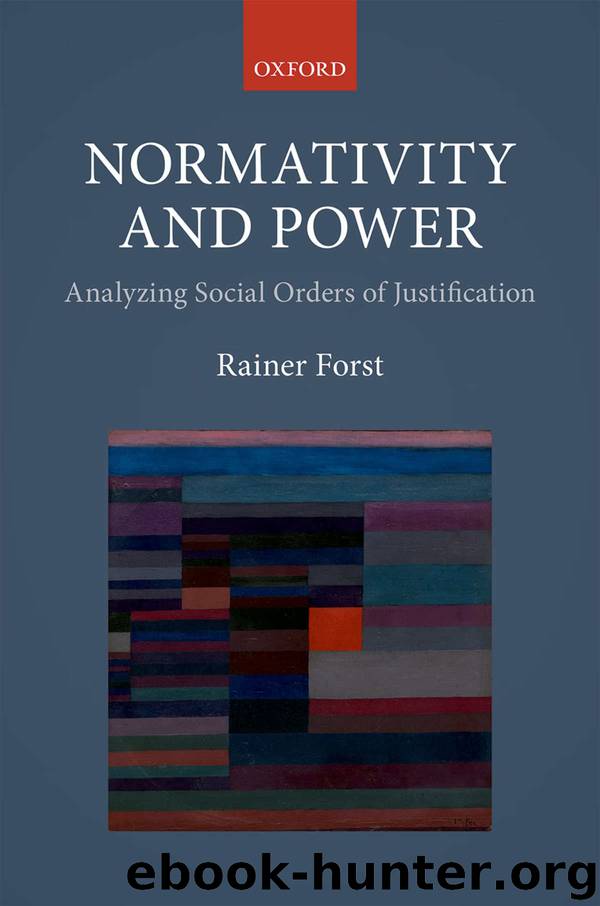Normativity and Power: Analyzing Social Orders of Justification by Rainer Forst

Author:Rainer Forst [Forst, Rainer]
Language: eng
Format: azw3
Publisher: OUP Oxford
Published: 2017-10-19T04:00:00+00:00
4. The Politics of Toleration
(1) While Kant’s philosophy of religion represents a step backward by comparison with Bayle’s conception from the perspective of a systematic theory of toleration, Kant, in contrast to Bayle, makes an immanent connection between his moral-philosophical argument and his political theory. Habermas clearly follows Kant in this regard. In both thinkers we find a translation of the moral principle of respect and justification into a theory of political legitimation in the medium of “public reason.” Bayle, by contrast, remains a child of his time in drawing a clear boundary between toleration at the social level and toleration at the level of the state. Unlike Calvinist monarchomachs such as Pierre Jurieu, Bayle clung steadfastly to the idea that a strong ruler is an indispensable guarantor of toleration at the state level. Bayle stands in the line of political thought extending back to Marsilius of Padua that sees a sovereign temporal state and ruler as a necessary counterweight to the power of the church(es). He remains a follower of the politiques, especially of de l’Hôpital, whom he describes in the corresponding article in the Dictionnaire as one of “the greatest men of his time.” He likewise praises Henry IV, who, in the Edict of Nantes, had for the first time accorded the Huguenots a certain level of protection against prosecution, calling him in the relevant article the “greatest among princes.” In the articles on Bodin, Grotius, and Hobbes, Bayle also leaves the reader in no doubt about his preference for an absolutist regime that is tolerant of religion over the “confusion” of democracy.93 Only a sovereign who stands above the religious and civil disputes of his time can keep the peace, according to Bayle.
(2) Kant, by contrast, develops a theory of law that contrasts law, as regards its content, with all ethical doctrines of happiness and, as regards its form, with moral imperatives, because positive law refers only to external actions and not to inner motivation. The essential difference between legality and morality for Kant resides less in the content of the respective laws than in the “incentives.”94 Thus the moral prohibition on the coercion of conscience finds its way into the law in such a way that the supreme principle of law already stipulates that restrictions on freedom of choice have to be justified: “Right is therefore the sum of the conditions under which the choice of one can be united with the choice of another in accordance with a universal law of freedom.”95 The foundation of this definition of law, which states that all forms of legal coercion must be justified in a reciprocal way among free and equal persons, is a moral basic right and human right to freedom understood in terms of natural law: “Freedom (independence from being constrained by another’s choice), provided that it can coexist with the freedom of every other in accordance with a universal law, is the only original right belonging to every man by virtue of his humanity.”96 This
Download
This site does not store any files on its server. We only index and link to content provided by other sites. Please contact the content providers to delete copyright contents if any and email us, we'll remove relevant links or contents immediately.
American Kingpin by Nick Bilton(3885)
Future Crimes by Marc Goodman(3597)
The Meaning of the Library by unknow(2571)
Inside the Middle East by Avi Melamed(2356)
Why Nations Fail: The Origins of Power, Prosperity, and Poverty by Daron Acemoglu & James Robinson(2297)
On Tyranny by Timothy Snyder(2231)
Living Silence in Burma by Christina Fink(2071)
Putin's Labyrinth(2021)
The Mastermind by Evan Ratliff(1937)
The Smartest Kids in the World by Amanda Ripley(1856)
Think Like a Rocket Scientist by Ozan Varol(1819)
Law: A Very Short Introduction by Raymond Wacks(1747)
It's Our Turn to Eat by Michela Wrong(1730)
The Rule of Law by Bingham Tom(1697)
Philosophy of law a very short introduction by Raymond Wacks(1670)
Leadership by Doris Kearns Goodwin(1638)
A Dirty War by Anna Politkovskaya(1630)
Information and Communications Security by Jianying Zhou & Xiapu Luo & Qingni Shen & Zhen Xu(1621)
Civil Procedure (Aspen Casebooks) by Stephen C. Yeazell(1556)
